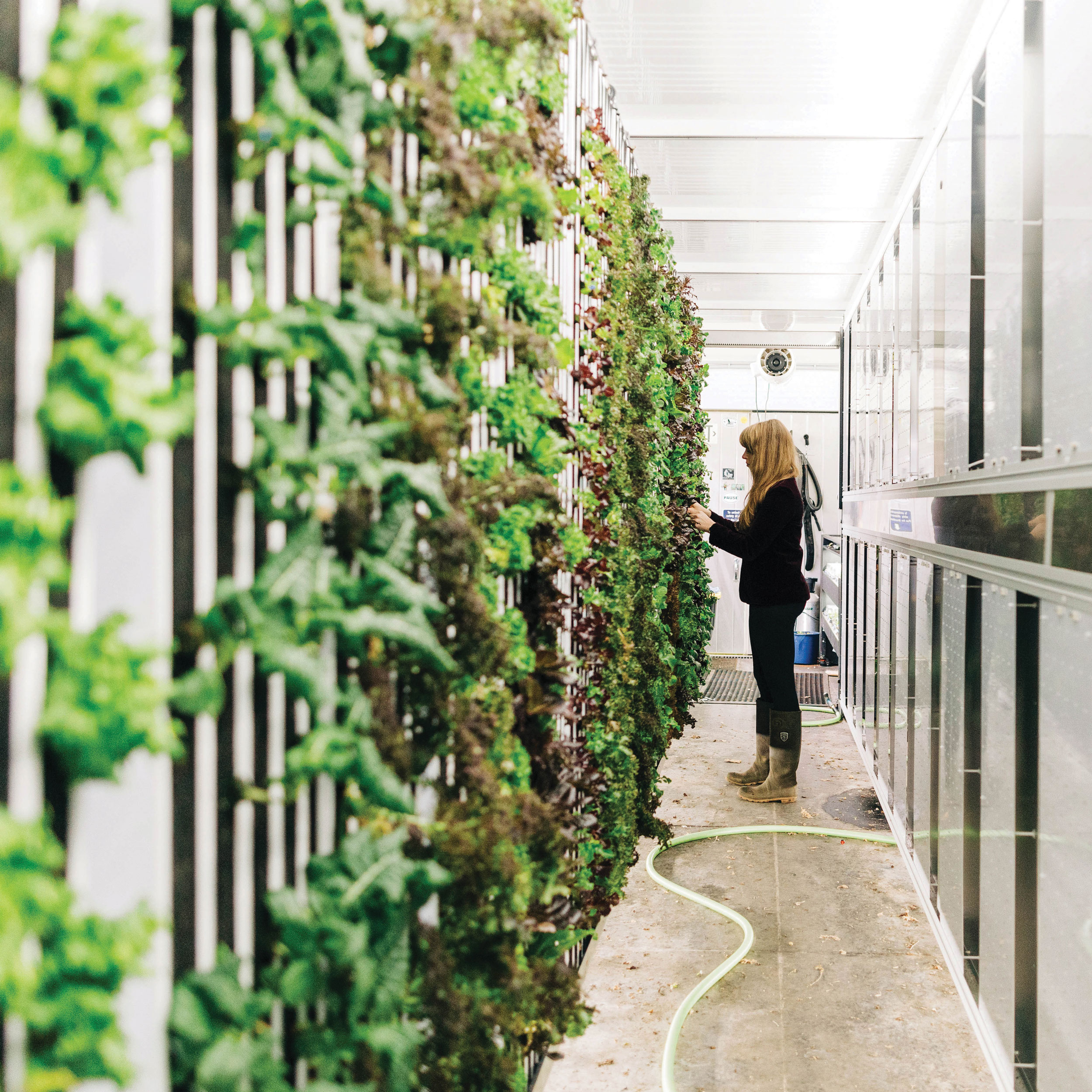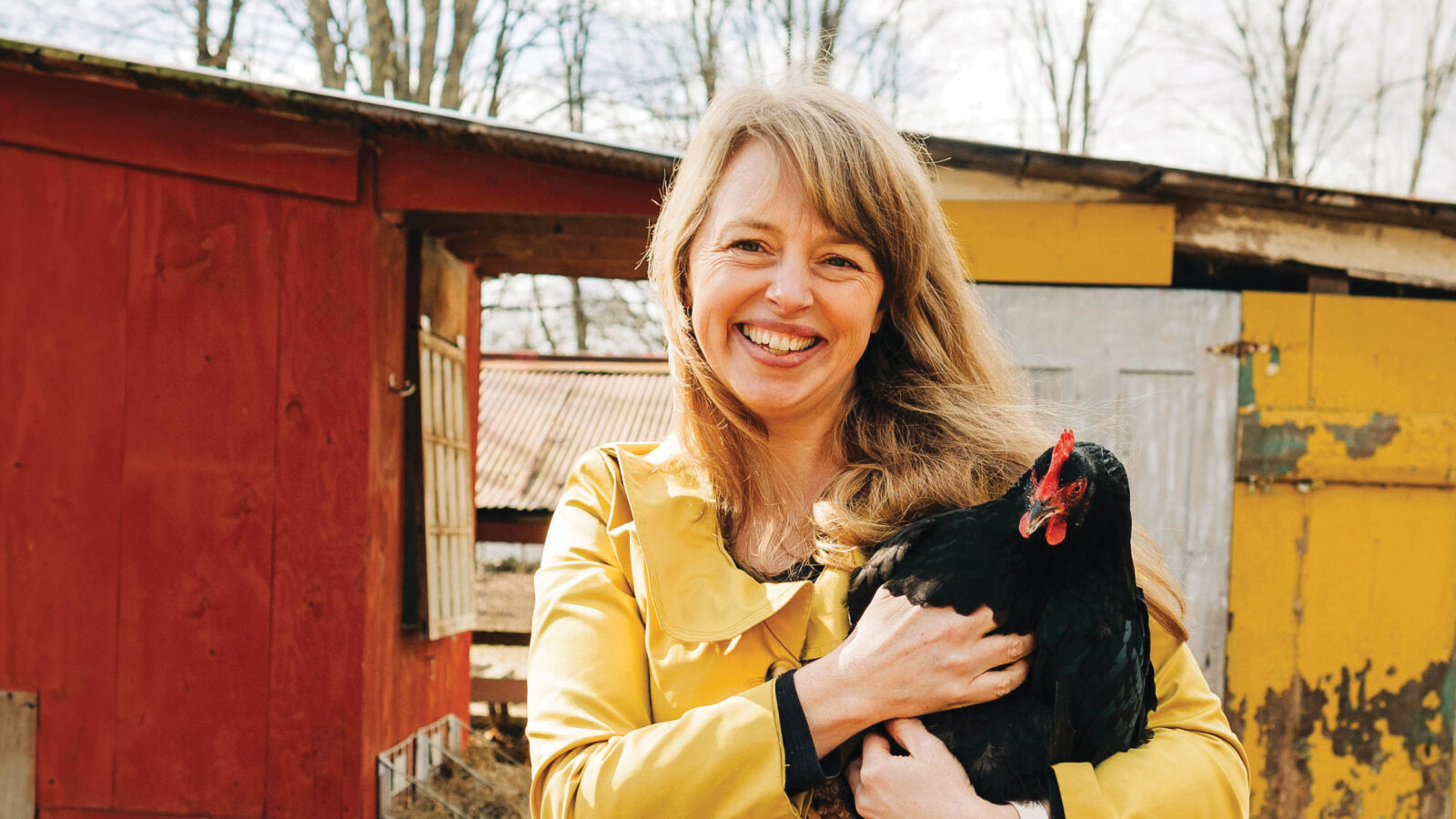For Miana Hoyt Dawson ’98, the pandemic planted the seeds for career change
When the pandemic hit, Miana Hoyt Dawson ’98 and her husband, Terry Dawson, had been working in engaging but consuming careers—she in marketing, he in engineering. The sudden change to being home with three children during lockdown gave them the time and space to reflect on what they were doing. Was there a way for them to spend more time together as a family? Could they apply their professional skills to a simpler and more meaningful existence?
For Dawson, the answer was yes. In 2021, she and her husband started a business called—appropriately enough—Pause & Pivot Farm, set on four open acres amid 40 acres of wooded mountainous land in Williamsburg, Massachusetts. “We wanted to create—or re-create—a traditional farm that addresses modern challenges,” Dawson says.
Their business reflects that mix of old and new. Next to the family’s 1774 farmhouse and 1830s barn sits an insulated 40-foot shipping container full of hydroponically grown greens, herbs, and lettuce plants, which they grow year-round. “You walk in and it’s like a forest of lettuce,” she enthuses. Wall- mounted LED lights provide the full-spectrum lighting that the plants need to grow.
The indoor, climate-controlled space protects the harvest from the whims of a changing climate. In 2023, as an early spring freeze and multiple flooding incidents threw the growing season into chaos across the Northeast, the container provided a measure of financial stability. The greens and herbs are sold via their online farm store; people can order bags or a seasonal subscription and then pick up at the farm (if they’re local) or opt for home delivery. Dawson also sells at farmers markets spring through fall and has a few farm-to-table restaurant customers.
When the Dawsons began growing hydroponically in the winter of 2017, it was originally for the family’s personal consumption, “What I affectionately call ‘basement lettuce,’” Dawson jokes, explaining that she had set up trays and lights under their home. “From there, it kind of stuck in my mind that this made a lot of sense for our area since we don’t have many options for salad greens and other tender greens in the winter, but there is a strong desire to buy locally when the option is there.” The initial experiment yielded the basic understanding of what indoor-grown leafy greens need to succeed: water, correct pH, nutrients, and light.
In addition to selling hydroponic greens, Pause & Pivot Farm hosts “experiences,” such as small-batch maple-syrup-making events in late winter or sharing a summertime cold beverage while visiting with the farm’s herd of miniature goats. The on-site farm store stocks farm-fresh eggs, sweet and savory baked goods made in their own farm kitchen, and home goods that Terry fashions from salvaged wood. A self-taught furniture maker, Terry’s pre-pivot job was at L-3, the former Kollmorgen, leading a team that built the internal components of periscopes. “He’s done research on traditional methods of working with wood and different finishes and techniques that he has really evolved into creating his own style of furniture,” Miana says. “We call it rustic refined.” Terry also makes custom wood engravings, signs, and cabinetry, and crafts a limited run of made-to-order Adirondack chairs each year.
Before the pause and the pivot, Dawson had been seeing her career accelerate. A native of Western Massachusetts, she met Terry while she was a student at Scripps College in Claremont, California, and he was serving in the Marines at Camp Pendleton in San Diego. After college, she got a job in marketing and fundraising at a nonprofit in the Pacific Northwest. Then in 2008, she returned home to Massachusetts to work in marketing at her family’s business, A.W. Hastings, then the sole distributor of Marvin windows for all of New England and part of New York state. Working in window distribution wasn’t necessarily a childhood dream of hers—she adds with a chuckle—but the work turned out to be surprisingly satisfying. Over the years, her responsibilities grew.
Then, in 2018, Marvin bought A.W. Hastings. “I went from leading a marketing team of 20 people to helping with integration into a 7,000-person company.” She relished the challenge and loved the work—until she didn’t. When her job became less about serving customers and more about the bottom line, “it became really challenging to continue to feel passionate about it.” It was time to pump the brakes.

Starting a farm had been a topic of family discussions for some time. Now they decided to make it happen, banking on the fact that what they were giving up—financial security—would be replaced by something more important. “It’s probably obvious, but worth noting, that stepping away from a corporate role and starting a small business comes with a major salary cut in the short term,” Dawson says. “I made this pivot as a way to design a life and career that was more aligned with my values.”
Miana and Terry’s three children were in favor. Kennedy ’22 is at St. Lawrence University; Milo ’27 is a first year at Williston; and 9-year-old Harrison is a likely future Wildcat. (Dawson’s siblings Josh Hoyt ’96 and Laurel Hoyt ’94 are also alums.) Miana’s Williston experience helped her navigate this crossroads. As she tells it, Williston taught her that life is not necessarily a straight line. “To find your path, you have to try a lot of different things,” she says.
“It was completely normal at Williston that you would take a photography class at the same time as you’re learning about Hitler and Nazi Germany. All these fundamental but dynamic topics were offered and you could explore the things that really spurred your curiosity.”
Making the decision to shift directions was also something she wanted her children to see—to set an example that pivoting can be the right move. “I think that that message is not shared with kids enough—that you might do something for a long time and you might grow out of it, and that’s OK.”
Post-pivot, Dawson feels the satisfaction of more ownership of her time. “One of the benefits I reflect on with gratitude almost weekly is that now I don’t have to choose which family activities I miss,” she says. “I design my schedule so I can be at almost every game, performance, dinner, etc. I don’t know many people in high-level roles that have this amount of ownership over their time. That’s a unique and priceless benefit of my new path.”

